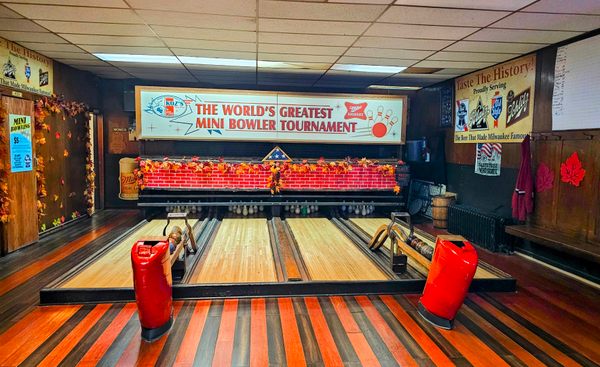One of Milwaukee’s best-regarded dive bars, Koz’s Mini Bowl is famous for a sport that barely extends outside of its walls: miniature duckpin bowling. For almost a century, Koz’s has been the home of what is now the last original mini duckpin bowling alley in the United States.
Readers should note that Wisconsin’s “duckpin bowling” is a different sport than the similar variety found in other regions. Although the two games use 10-inch pins and 3-pound balls, standard duckpin bowling is played on a standard bowling lane, while mini bowling uses 16-foot lanes that fit in a bar. And while traditional duckpin bowling is too difficult to achieve a perfect score of 300, perfect games in mini bowling are common.
At Koz’s, there is no computer scoring, and everything remains as it was since the 1940s, including the presence of pinsetters (bar employees whose job it is to set and replace the pins by hand).
The bar, located on Milwaukee’s southeast side, predates its mini bowling heyday by quite some time. The original tavern was established in 1887 by a Prussian immigrant named Jacob Jagodinzki and his family. Through the years, the bar would pass through several owners and additions, weathering Prohibition and a series of remodeling and expansions. An owner named Ben Szjena added the duckpin bowling lanes around 1947.
Sam Chenich, the bar’s next owner, formed bowling leagues in the 1960s, and the bar sport began to take off. Interest had already begun to wane by 1976, when Parkview Lanes was purchased by DuWayne Kosakoski (“Koz”). The bar has remained in the Kosakoski family ever since, even as all of Milwaukee’s other mini bowling alleys closed. DuWayne’s son, Justin, has operated it since his father’s passing in 2002.
Today, Koz’s Mini Bowl is one of the few places where you can try the sport, and the only one that is original. Mini bowling aside, the place remains a classic example of a Milwaukee corner bar, from the classic jukebox and pool table to the wood paneling and memorabilia, and of course, the Pabst Blue Ribbon, Leinenkugel’s, and other beers on tap.
Justin explored selling the bar in the wake of the COVID-19 pandemic, but decided to hold on to it for its sentimental and historic value. Over the years, it has collected many accolades, including being named one of the best bars in America by Esquire and a historic landmark by the city of Milwaukee. And whether you’re a tourist attracted by the thrill of trying an obscure sport or a local soaking in the bar’s convivial atmosphere, you’re part of the community that’s been developed by this Milwaukee institution.

